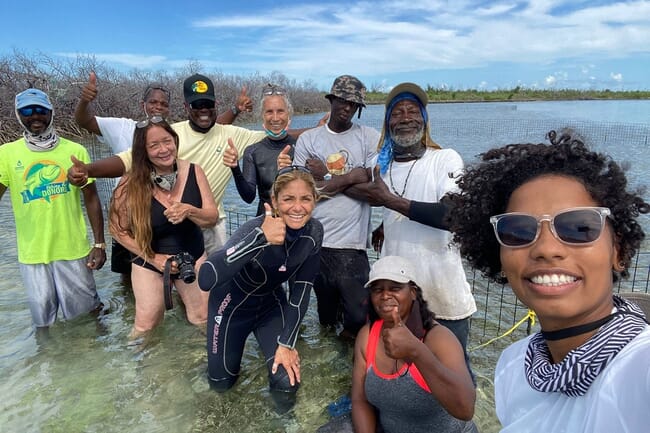
(Left to right, top row) Joe Thomas; Nako Brice; Shervin Tate; Megan Davis; Ph.D., Randy Reckley; and Leroy Glinton. (Left to right, bottom row): Gail Woon, Earthcare; Cristina Zenato; Tereha Davis; and Jewel Beneby, Bahamas National Trust in Grand Bahama. © Jewel Beneby
The grant will help to expand FAU Harbor Branch’s bid to replenish queen conch populations throughout the Caribbean. It also enables development of a conceptual master plan for a 25-acre innovation hub on Grand Bahama for researchers working to solve issues of island sustainability.
The project is built on a network of collaborations to secure local support and participation. FAU Harbor Branch will partner with the community of Grand Bahama on a pilot-scale queen conch farm led by Dr Megan Davis, the world’s leading expert on queen conch aquaculture, with 40 years of research in the field. Prized for its iconic spiral shell and meat, the species is considered a cornerstone of the Bahamian culture and economy. Through partnerships, the project leads envision developing new economic and environmental opportunities for the community, along with helping to replenish queen conch populations.
“We’re extremely grateful to Builders Initiative for their generous support of our queen conch restoration efforts,” said FAU President Stacy Volnick, in a press release from FAU. “FAU Harbor Branch’s work in aquaculture is helping to meet the growing global demand for food, thanks to partners like Builders Initiative who share our belief in sustainable solutions to environmental challenges.”
The project will begin this summer with a mobile queen conch lab, where scientists, with assistance from Bahamian staff and interns, will grow queen conch from their egg stage to juveniles. It will be located at Coral Vita, a commercial coral farm working to restore coral reefs, which will share resources with FAU Harbor Branch.
Blue Action Lab is a key strategic partner, assisting with permits, negotiations, and other collaborator relationships. Other partners include the Bahamas National Trust, the University of The Bahamas, the Perry Institute of Marine Science, and The Nature Conservancy, which will provide expertise on habitat mapping for conch breeding sites in seagrass beds.
“Having a hatchery operating in the community with full participation from the community will be a great way to not only increase knowledge and awareness of the life cycle of the conch, but it will also allow the opportunity to build relationships, technical skills and solutions together,” said Catherine Booker, program coordinator with the Bahamas National Trust.
The project also will provide research internships for students at the University of The Bahamas and ecotourism opportunities.
Similar opportunities would come about through the 25-acre innovation hub. Known as Conservation Cove, it will be located on 25 acres on Grand Bahama, and it is envisioned to include a tropical aquaculture park, an aquarium, research and education hub, co-working spaces, and a hospitality centre. FAU’s MetroLAB Design Collaborative, comprising FAU’s School of Architecture and Harbor Branch, will work with Blue Action Lab on the master plan.
The Grand Bahama queen conch hatchery is the fifth such FAU partnership project to restore the queen conch throughout the Caribbean. FAU Harbor Branch has been working on restoration efforts since 2016 and has established other queen conch farms in Puerto Rico, Curacao and Great Exuma, Bahamas.
“Our FAU Harbor Branch Queen Conch Lab team together with our partners are making strides to fulfill the vision of a conch farm in every Caribbean nation,” said Davis. “There has never been a more important time to help communities grow queen conch for the sake of the species, ecosystem, and the people who depend on the fishery.”
This support from Builders Initiative, the philanthropic team of Builders Vision, is the largest gift from a private funder to FAU Harbor Branch’s queen conch program. Builders Initiative invests and collaborates with people and organizations working toward sustainable solutions in the areas of food and agriculture, climate and energy, oceans, and community.
“Builders Initiative is thrilled to be an anchor funder of Florida Atlantic University’s innovative program to establish conch aquaculture hatchery facilities across the Caribbean,” said Peter Bryant, oceans program director at Builders Initiative. “We’re committed to accelerating restorative aquaculture solutions in The Bahamas, and this project is a cornerstone of our program, one that will restore conch populations in The Bahamas while also providing benefits to local communities.”




